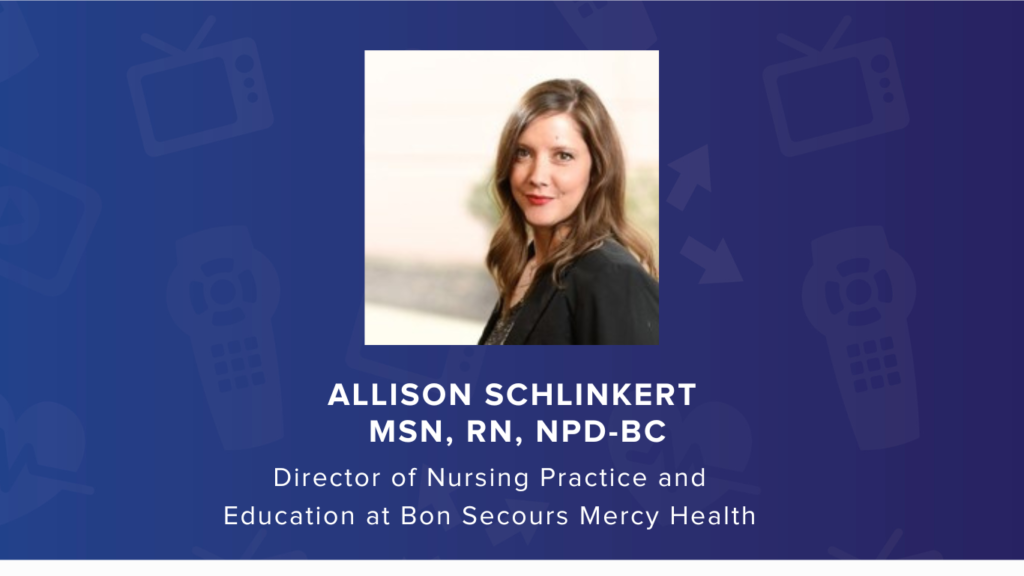
Nurse leaders have faced unprecedented challenges in today’s healthcare system. Recently, MDM Healthcare’s VP of Clinical Excellence, Linda Robinson MSN, BSN, RN was able to sit down with Allison Schlinkert, MSN, RN, NPD-BC, Director of Nursing Practice and Education at Bon Secours Mercy Health. The two discussed the topic of being a servant leader and what that means in relationship-based care.
Relationship-based care can transform nursing culture. It does this by improving patient and staff satisfaction, safety, and the quality of care. This is accomplished by strengthening every relationship within an organization. Schlinkert shared why this leadership style is so important in today’s ever-changing, challenging healthcare landscape. “Being a servant leader means that you value the relationships you create and work to build bi-directional trust to optimize your team's performance. It's about establishing relationships with your team, putting those relationships first and investing in them so you can optimize your team's performance,” she said.

The issues of resiliency and leadership in nursing have become increasingly important in today’s healthcare climate. In fact, they are part of the new quadruple aim outlined in the framework to optimize healthcare performance, which was developed by the Institute for Healthcare Improvement (IHI) in 2007 and recently revised to include healthcare team well-being in the framework. “I strongly believe that the support that is shown to you through the whirlwind makes it more manageable,” said Schlinkert.
Robinson noted, “So many times nurses leave or stay because of their leaders. When you create relationships, you create bonds and build trust, and that's so important, and it makes a significant difference in nurses' lives. These practices are truly transformational for new nurses, and nurses that have worked in the trenches for a long time, because many do not get that support.”
Schlinkert explained that establishing bi-directional trust with your team is essential for nurse leaders. “My team is composed of nurse professional development practitioners who support multiple units, and that can be challenging. You have to give the same touch and feel and support to each unit across the board. One of the ways that I encourage my team to be servant leaders is to scratch beneath the surface with the operational leaders they support and get to know their managers. I encourage them to spend a few minutes touching base with their leaders about once every two weeks and show genuine interest in their lives,” she said.

Nurse leaders are stepping up to address the problems they are facing in this current healthcare climate with elevated leadership practices such as the ones outlined by Schlinkert. Another tool nurses have to help them rise to new challenges is technology. Technology such as Journey PX, a patient engagement solution that has the capability to support care delivery by leaning down clinical workflows, automating the patient education process, offloading non-clinical tasks, and offering the capability of video connect into the patient room. This reduces exposure while still maintaining that face-to-face personal contact sentiment. Journey PX helps save nurses and the healthcare team valuable time and steps during this critical period.

In addition to building trust and communication, Schlinkert revealed several other practices that she has implemented to support the nurses on her team. “My team rounds on all new hire nurses for their first year of employment. This was something that we identified as a priority prior to March of 2020 when the pandemic hit, and really has shifted from an initiative to a core job responsibility for my nurse professional development practitioners,” she said. “Rounding serves as a safe space to share successes and barriers, review unit enculturation, and identify gaps in education that my team is often able to close,” she continued.
Robinson noted that the practices outlined by Schlinkert support core issues hospitals are currently facing which include, retention of nurses, the nursing shortage, and addressing the experience complexity gap among nurses. “These practices give new nurses a safe space. It also helps create a supportive culture that spreads,” she said.
Another leadership practice Schlinkert began two years ago is a program called Call to Shine, which works to build support and comradery “Call to Shine is an internal recognition board and it really is a way to call out and recognize associates, coworkers, peers, and colleagues new to practice nurses when they do excellent in a simulation, you know, the sky's the limit as it relates to this recognition,” Schlinkert explained. “A lot of people just want to be recognized for the work that they do and Call to Shine was a great way to do this and it has picked up so much steam since it began. This is how we support and lift our managers up so they can know about all those remarkable things,” she continued. The program also allows participants to earn rewards through a points system, so they are rewarded for doing exceptional work.
Robinson expressed that the way to positively impact nurses is through leadership, mentorship, and readily available, effective resources. Technology is one resource that can dramatically improve working conditions for nurses, helping to optimize their time and enhance their ability to assist patients and work with their teams. “At MDM, our experienced team is dedicated to healthcare innovation and transformation. The power of technology in healthcare settings is most impactful when incorporating clinical nurses, and bedside nurses. We know that nurses are the cornerstone of the healthcare system, and right now they are stretched thin during this unprecedented time, and we want to help support them,” Robinson said.

You can hear more from Allison Schlinkert about being a Servant Leader, including effective mentorship, work culture, and more in our latest PX Space podcast interview.

